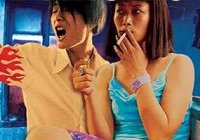 Shadows: Arthouse Films ’03
Shadows: Arthouse Films ’03
THE BOY DAVID STORY | LA COMUNIDAD | UNKNOWN PLEASURES
< < M O R E | M O R E > >
More mainstream art films have their own pages.
Even more offbeat films are at the SHADOWS FILM FESTIVAL.
last update
2.Aug.03
 BAD GUY
BAD GUY

|
dir-scr Kim Ki-duk with Cho Jae-hyn, Seo Won, Kim Yun-tae, Choi Duk-moon, Shin Yoo-jin, Kim Jung-young, Nam Gung-min release Korea 11.Jan.02; UK 11.Jul.03 • 02/Korea 1h40  REVIEW BY RICH CLINE |
There's a tender, twisted love story in here, because Han-gi's actions aren't out of revenge. We never quite understand why he's doing this, but we can tell he genuinely cares for Sun-Hwa, even as he sends her to hell and back. Writer-director Kim captures an eerie sense of urban angst, using subtly subversive filmmaking to examine issues of obsession and codependence with heavy overtones of guilt, coercion and romance. The cast is excellent in nearly wordless roles. This is a quiet film, insidious in the way it both engages and repels us, although things get a bit over-complicated in the middle, which leaves a couple of characters confusingly muddled (and a couple of them dead!). The grim underworld of vice and violence isn't remotely glamorised or prettied up for us. And there are a couple of surprising turns in the story as it approaches its clever and unsettlingly sweet ending. [18 strong themes, violence, language, sex] 30.Jun.03
 EL BONAERENSE
EL BONAERENSE

|
dir-scr Pablo Trapero with Jorge Roman, Dario Levy, Mimi Ardu, Anibal Barengo, Graciana Chironi, Victor Hugo Carrizo, Hugo Anganuzzi, Gaston Polo, Roberto Posse, Luis Viscat, Lucas Olivera, Jorge Luis Gimenez release release Argentina 19.Sep.02; UK 29.Aug.03; US 26.Nov.03 • 02/Argentina 1h38  REVIEW BY RICH CLINE |
Stunningly shot in earthy graininess, Trapero's film feels so real it's hard to remember this is fiction. Performances are natural and raw without ever relying on movie stereotypes, while the interrelationships are complex and deeply intriguing, especially as Zapa starts forming liaisons with a female police academy instructor (Ardu), his loose-cannon superior (Barengo) and his seriously in-control boss (Levy). And the contrast between Zapa's country boy mentality and the city man he must become is chilling--cleverly showing the change from a simple locksmith with a shaggy mullet to an urban cop with a sharp buzz cut. But it's much deeper than that as the slow-learner Zapa must catch up with what's happening around him. This is dense and intense filmmaking with a lot going on, edited in an anecdotal style with short scenes that speak through subtext, and building up to a couple of life-changing sequences when Polaco shows up again. It's quite sad, really. But fascinating work from a filmmaker to watch. [15 themes, language, violence, sex] 8.Jul.03
 THE BOY DAVID STORY
THE BOY DAVID STORY

|
dir Alex McCall; scr Desmond Wilcox, Alex McCall with David L Jackson, Ian Jackson, Marjorie Jackson, Martine Schopfer, Mary Rodriguez, Ellie Zuniga, Norma Calderon, Katie Till, Paula Pugliese, Tony Anderanin, Violetta de Belaundi, Dougray Scott release UK 12.Sep.03 • 03/UK 1h35  REVIEW BY RICH CLINE |
McCall and the late journalist Desmond Wilcox worked on this project for more than 20 years, revisiting the Jacksons at key intervals. The film feels like a late-70s school film with its grainy footage, surging music and emotional narration (voiced by Dougray Scott). And it's been edited to skip over anything too unpleasant (there's no mention of familial discord, although you can sense it's there) while strangely repeating clips over and over to restate its central theme about a young boy plucked from certain tragedy and taken to the land of promise and opportunity. This makes the whole thing feel sweet, cheesy ... and imperialistic, centring too much on the Jacksons and looking at David as a remarkable achievement. Far too much time is given to the adoption process, which is a gripping story but slightly off the main path. Because David's own story is astonishing; looking at his ever-emerging face forces us to confront our own physical prejudices. And the film leaves us wanting to know the real David, including his dark side. The intensely emotional sequence where he reunites with Schopfer in the Lima hospital, then travels back to the rainforest for the first time, feels like the tip of an iceberg. [PG themes, images] 1.Aug.03
 LA COMUNIDAD
LA COMUNIDAD

|
dir Alex de la Iglesia; scr Jose Guerrica Echevarria, Alex de la Iglesia with Carmen Maura, Eduardo Atuna, Maria Asquerino, Emilio Gutierrez Caba, Roberto Perdomo, Jesus Bonilla, Enrique Villen, Marta Fernandez Muro, Paca Bagaldon, Ane Gabarain, Sancho Gracia, Kiti Manver release Spain 29.Sep.00; UK 4.Jul.03 • 00/Spain 1h50  REVIEW BY RICH CLINE |
De la Iglesia directs the film with a stylish flair for both comedy and thrills--we're usually laughing and jumping at the same time. Colourful sets, inventive direction and superb performances bring it to life, as does production design reminiscent of Hitchcock films from Vertigo and The Birds to Rear Window and North by Northwest. With a bit of Star Wars thrown in as well. It's gleefully unhinged, manic and energetic, and packed with stunningly violent set pieces that tap into claustrophobia, loneliness, suspicion and, most of all, greed. Maura is fabulous as usual, performing with her entire body and even giving life to the brand new pink suit she's just bought to impress the clients ... and which is becoming increasingly blood stained. And the building residents are all cleverly drawn characters, each with sharp personalities and specific variations on greedy desperation. They're like frenzied pitbulls that won't let go once they get their teeth onto something--in this case the suitcase of cash Julia is trying to smuggle out of the building. Yes, as the film cranks up to its hysterical climax, it actually manages to make us think. In between our giggles and screams, that is. [15 themes, language, violence, grisliness] 1.Jul.03
 UNKNOWN PLEASURES
UNKNOWN PLEASURES

|
dir-scr Zhang Ke Jia with Zhao Wei Wei, Wu Qiong, Zhao Tao, Zhou Qing Feng, Li Zhu Bin, Wang Hong Wei, Bai Ru, Liu Xi An, Xu Shou Lin, Ying Zi, Ren Ai Jun, Xiao Dao release US 26.Mar.03; UK 11.Jul.03 • 02/China 1h53  REVIEW BY RICH CLINE |
Zhang films the action in long, languorous takes that go on and on without much happening. Most scenes feel heavily improvised, pointlessly rambling just like the characters, while a slight semblance of plot holds the narrative together. But it's not remotely easy going. There is some life and wit, as well as some character development if we can keep with it. And the central theme is timely and important (the title comes from a poem about doing what feels right). Without any reason to live, these young people just look for the quick and easy route to whatever happiness they can find right now. But besides one sharply funny Pulp Fiction reference, the film is as lifeless and meandering as the unlikeable characters. The endless tracking shots don't help; they add to the mood but never let us into the scenes as we watch expressionless faces just staring into the middle distance, often not even bothering to talk to whoever is nearby. Colourful and urgent ... and excruciatingly dull. [12 themes, language] 2.Jul.03